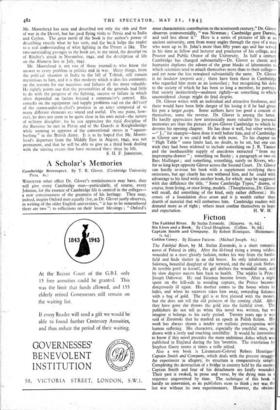A Scholar's Memories
Cambridge Retrospect. By T. R. Glover. (Cambridge University Press. 6s.) •
WHATEVER other effect Dr. Glover's reminiscences may have, they will give every Cambridge man—particularly, of course, every Johnian, for the essence of Cambridge life is centred in the colleges— a new consciousness of the greatness of his heritage. They may, indeed, inspire Oxford men equally (for, as Dr. Glover justly observes, in writing of the older English universities, " it has to be remembered there are two ") to reflections on their lesser blessings ; " Oxford's most characteriatic contribution to the nineteenth century," Dr. Glove! observes controversially, " was Newman ; Cambridge gave Darwin, and said less about it." Here is a series of pictures of life at an ancient university, seen from many angles through the eyes of a' man who went up to St. John's more than fifty years ago and has served in his time as fellow and lecturer and praelector of his college, and Proctor and Public Orator of the University. In half a century Cambridge has changed substantially—Dr. Glover as classic and humanist deplores the advent of the great blocks of laboratories to which scientists tend to attach themselves more than to their college— and yet none the less remained substantially the same. Dr. Glover is no laudator temporis acti ; there have been those in Cambridge who regarded him more as an iconoclast ; but recognising his debt to the society of which he has been so long a member, he portrays that society instinctively—andmost rightly—as something to which unconsidered change might do fatal despite.
Dr. Glover writes with an individual and attractive freshness, and there would have been little danger of his losing it if he had given his pen a larger ,scope. Some authors have too good a conceit of themselves, some the reverse. Dr. Glover is among the latter. He hardly appreciates how intrinsically more valuable his personal memories are than the picture of pre-Glover Cambridge to which he devotes his opening chapter. He has done it well, but other writers —" J.," for example—have done it well before him, and of Cambridge as Glover saw it we could well do with more. To his chapter on " High Table " some limits had, no doubt, to be set, but one can wish they had been widened to include something on J. R. Tanner and the inexhaustible supply of anecdotes extracted " from my impromptu-drawer " ; something on Bushy ; a paragraph or two on Bass Mullinger ; and something, something, surely on Rivers, who for so long kept opposite Glover across the Second Court. Dr. Glover can hardly re-issue his book with a supplement rectifying these omissions, but age clearly has not withered him, and he could with advantage to his kind write another book, for which may be suggested with due diffidence the title, " Some Cambridge Types," drawn, of course, from living, or once living, models. (Theophrastus, Dr. Glover will recall, did something of the kind, only rather different.) He comes of a foundation dives amtm and it is wealth rather than dearth of material that will embarrass him. Cambridge readers will demand more as of right ; others must confine themselves to hope


























 Previous page
Previous page